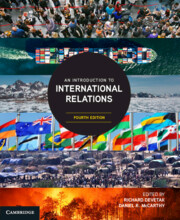Book contents
- Frontmatter
- Contents
- Tables, figures and boxes
- Contributors
- Preface and acknowledgements
- Guide to online instructor resources
- Introduction: The origins and changing agendas of international relations
- Part 1 Theories of International Relations
- Part 2 International history
- Part 3 The traditional agenda: States, wars and law
- Chapter 12 The modern state
- Chapter 13 Nations and nationalism
- Chapter 14 Security
- Chapter 15 Arms control and disarmament
- Chapter 16 The ethics and laws of war
- Chapter 17 International law
- Chapter 18 Diplomacy
- Chapter 19 The United Nations
- Part 4 The new agenda: Globalisation and global challenges
- References
- Index
- Figure and text acknowledgements
Chapter 13 - Nations and nationalism
from Part 3 - The traditional agenda: States, wars and law
Published online by Cambridge University Press: aN Invalid Date NaN
- Frontmatter
- Contents
- Tables, figures and boxes
- Contributors
- Preface and acknowledgements
- Guide to online instructor resources
- Introduction: The origins and changing agendas of international relations
- Part 1 Theories of International Relations
- Part 2 International history
- Part 3 The traditional agenda: States, wars and law
- Chapter 12 The modern state
- Chapter 13 Nations and nationalism
- Chapter 14 Security
- Chapter 15 Arms control and disarmament
- Chapter 16 The ethics and laws of war
- Chapter 17 International law
- Chapter 18 Diplomacy
- Chapter 19 The United Nations
- Part 4 The new agenda: Globalisation and global challenges
- References
- Index
- Figure and text acknowledgements
Summary
While nations and nationalism have become the dominant mode of ascribing political culture in world politics, understanding the meaning and political importance of these terms has been a notoriously challenging task. One survey of concepts in International Relations said of the term ‘national interest’ that it was ‘the most vague and therefore easily used and abused’; of nationalism, that ‘there is a lack of consensus about what it is and why it has maintained such a firm hold over so much of the world’s population’; and that ‘Nations and states seem identical but they are not’ (Griffiths and O’Callaghan 2002: 202–13). Notwithstanding this confusion, nationalism is typically characterised as both an important form of cultural identity and a pervasive political ideology affirming that territorial communities called nations are necessary for human flourishing and that each nation should therefore be accorded a degree of autonomy in determining its own affairs (Woods et al. 2020: 813).
Keywords
- Type
- Chapter
- Information
- An Introduction to International Relations , pp. 181 - 194Publisher: Cambridge University PressPrint publication year: 2024



